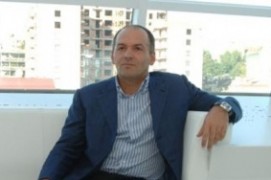Second edition of $100,000 art prize launched online
The Future Generation Art Prize, funded by the Victor Pinchuk Foundation in Ukraine, is open to any artist around the world up to the age of 35.
The second edition of the Victor Pinchuk Foundation’s Future Generation Art Prize, worth $100,000, was launched this week with a press conference streamed live on The Art Newspaper’s website and moderated by our founding editor Anna Somers Cocks. Applications for the award are now available online at futuregenerationartprize.org until 6 May, with the winner due to be chosen in December.
Speaking at the conference from Kiev on Monday 6 February, the Ukrainian collector and the foundation’s founder Victor Pinchuk said: “With our prize, we don’t want to reward the past, but we want to inspire and present the future. We want to act as social investors into the arts. Our prize is the equivalent of an incubator or, if you wish, an accelerator for start-up businesses.”
One of the main focuses of the discussion was the prize’s global reach and openness: artists up to the age of 35 from anywhere in the world can apply to win. “Everybody can apply, from everywhere. The best get advice and resources for new work and a chance to present themselves to the world. For me this is an exciting social investment, creating inspiration for societies,” said Pinchuk. Richard Armstrong, the director of the Guggenheim Museum in New York and a member of the prize’s board, said the award is “not only generous, it’s efficient and egalitarian… Anyone with access to a computer can put his or her work on view and be considered.”
Four eastblished artists—Damien Hirst, Jeff Koons, Andreas Gursky and Takashi Murakami—are also due to serve as mentors to the winning artist. “Art is about connecting and I think it’s really important to try to help other artists,” said Koons during the press conference.
Talking about the impact that winning a major prize can have on an artist, Hirst said winning the Turner Prize, “definitely helped my career and a lot of people took me more seriously. I think you can underestimate the power of the cash prize as well. It enables artists to have more ambitions and make greater work. The money is the key really to enable them to grow.” The winner of the first Future Generation Art Prize, the Brazilian artist Cinthia Marcelle supported his point, revealing that the prize allowed her to “involve more people in my team working with me” and to pay them better.
Finally, near the end of the conference, Nicholas Serota, the Tate’s director and a member of the prize’s board, said that “creating a prize also gives you the opportunity to have a debate, not between the artists but rather more about the art.” Having overcome a technical glitch, which kept Serota from joining in the video discussion though he was eventually able to speak via telephone, he added that “maybe the communication hasn’t been perfect this afternoon, but you have a sense that people are working across the world who can talk to each other, and therefore a prize that covers the whole world is certainly a viable concept.”
Source: www.theartnewspaper.com
